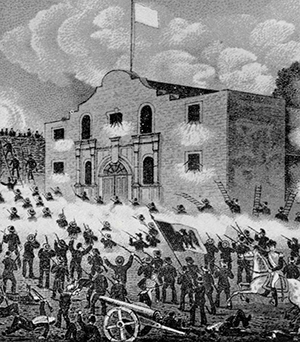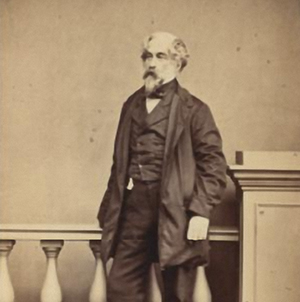ON THIS DAY
Published in Issue 2 (March/April 2022), News, Volume 30BY AODHÁN CREALEY
MARCH
06/1836

Above: The Battle of the Alamo (1836)—at least nine men born in Ireland fought and died in the siege.
The Siege of the Alamo ended when the forces of General Antonio López de Santa Anna overran the former Franciscan mission near San Antonio, Texas, which 184 settlers had heroically defended for thirteen days. The final assault by a Mexican army of between 1,800 and 6,000 men lasted less than an hour, and on Santa Anna’s orders no prisoners were taken. The commander at the mission, the youthful Col. William B. Travers (26), who had Scots-Irish connections, died fighting to the end, but the legendary slave-smuggler and frontiersman Jim Bowie (c. 40) saw little of the action. Bedridden in a fevered daze with typhoid throughout the siege, he still managed to fire a single pistol shot at the Mexican troops who bayoneted him to death. The fate of that other legend, Col. David ‘Davy’ Crockett (49), however, is still contested. A descendant of a family from Castlederg, Co. Tyrone, that had emigrated to America during the great, mainly Presbyterian, migration of the early eighteenth century, it was traditionally believed that he died in a heroic last stand, still wearing his racoon-tailed hat, surrounded by the corpses of seventeen Mexicans that he had killed, as portrayed by John Wayne in the movie The Alamo (1960). In recent years, however, new evidence has come to light that strongly suggests that he surrendered and was subsequently executed. What we do know is that at least nine men born in Ireland fought and died in the siege. In a museum on the battle site, where the flags of every state and country represented amongst the defenders are displayed, their names, most of which suggest an Ulster Presbyterian background, are inscribed under an Irish Tricolour (sic).
04/1972
Two women were killed and c. 70 injured, many losing limbs, when an IRA bomb exploded without warning in the crowded Abercorn Bar in Belfast’s city centre.
09/1972
Four members of the IRA were killed when a bomb they had prepared exploded prematurely in Belfast’s Falls Road area.
09/1982
The 23rd Dáil Éireann assembled. Charles Haughey was elected taoiseach by a majority of seven, including independent TD Tony Gregory. Gregory’s support had been secured after Haughey signed an agreement with him, pledging development worth £91m for inner-city Dublin.
15/1922
Eamon de Valera founded Cumann na Poblachta, supported principally by opponents of the Treaty.
20/1972
Seven people were killed and c. 150 injured when a 200lb IRA car bomb exploded in Donegal Street, near Belfast city centre.
24/1922
Uniformed police officers broke into the home of Catholic publican Owen McMahon in north Belfast and shot him dead, along with four of his sons and one of his employees.
24/1972
Following the resignation of the Northern Ireland prime minister, Brian Faulkner, and his cabinet over the transfer of security to Westminster, Prime Minister Edward Heath announced that the Northern Ireland government would be suspended and replaced by direct rule from Westminster, with William Whitelaw as secretary of state.
26/1922
An army convention held in the Mansion House, attended by 220 delegates representing 52 of the IRA’s 73 brigades, repudiated the authority of Dáil Éireann.
27/1972
Eight people, seven of them young girls, died when fire destroyed the offices of Noyek’s timber merchants in Parnell Street, Dublin.
30/1922
The second Craig–Collins agreement was signed. Craig agreed to recruit Catholics into the Ulster Special Constabulary, whilst Collins agreed to quell IRA activity in Northern Ireland. Neither side delivered on their undertakings.
APRIL
06/1879
Lord George Hill (77), landlord, whose estates covered some 23,000 acres in north-west Donegal, died. Hill is perhaps best remembered for Facts from Gweedore (1845), his account of the conditions of his tenants in the biggest parish of his estate and how he had improved their lives by abolishing the rundale system, introducing manufacturing and constructing a network of roads through what was a hitherto inaccessible region. His tenants, however, thoroughly disagreed. The abolition of rundale they regarded as a disaster. His clampdown on illicit distillation had denied them a critical source of ready cash, and other changes, such as his withdrawal of access to summer grazing on the mountains, further impoverished them. Indeed, if other landlords sought to imitate his methods, the House of Commons select committee on Irish poverty were less impressed and went so far as to investigate his methods. On the other hand, Hill is remembered as the landlord who studied Irish history and learned the language, the better to communicate with his tenants, and who worked tirelessly on their behalf during the Famine. He is remembered, too, for his connection with the sisters Cassandra (Cass), Louisa (Lou) and Marianne (May) Knight, nieces and favorites in their childhood of the novelist Jane Austen (1775–1817). Hill married the youngest, Cass, in 1834, making their home at Ballyare House, near Ramelton. When Cass died eight years later after giving birth to their fourth child, Lou joined the household to mind the children and ended up marrying Hill five years later; in 1884 May moved in to care for Lou. Hill was interred with Cass in Conwal Cemetery, Letterkenny, while Lou and May were buried in the graveyard of Tully, adjacent to Ballyare.
01/1922
In reprisal for the murder of a policeman in north Belfast some hours earlier, uniformed RIC officers broke into Catholic homes in the area and murdered six civilians, including an eight-month-old child.
05/1922
The Royal Ulster Constabulary (RUC) was formed. Including the Ulster Special Constabulary, by the early summer there were some 50,000 employed as regular or part-time policemen in Northern Ireland.
06/1972
The Scarman report, on violence and civil disturbances in Northern Ireland in 1969, described the riots as communal disturbances arising from a complex political, social and economic situation.
07/1922
The Civil Authorities (Special Powers) Bill became law, giving the minister for home affairs authority to detain suspects and to set up courts of summary jurisdiction.
09/1922
The anti-Treaty IRA executive appointed a seven-man army council, with Liam Lynch as chief-of-staff.
13/1922
Anti-Treaty IRA, under the command of Rory O’Connor, occupied the Four Courts.
15/1972
Joe McCann (25), a prominent figure within the ranks of the Official IRA, was shot dead in disputed circumstances by members of the Parachute Regiment close to his home in the Markets area of Belfast.
18/1952
Edmund O’Brien (71), County Limerick-born author and yachtsman who in 1923 circumnavigated the globe in his ketch Saoirse, died.
19/1972
The Widgery tribunal of inquiry into events in Derry on ‘Bloody Sunday’ exonerated the British army for the deaths and blamed the NICRA for organising the march.
25/1922
Commandant O’Neill, 3rd Cork Brigade IRA, was shot dead at the home of a Protestant family in Bandon, Co. Cork. In a series of unattributed reprisals, thirteen Protestant civilians were shot dead in the surrounding area over the following four days.
27/1822
Ulysses Simpson Grant, general in the Union army and 18th president of the United States (1869–77), born in Ohio.

















